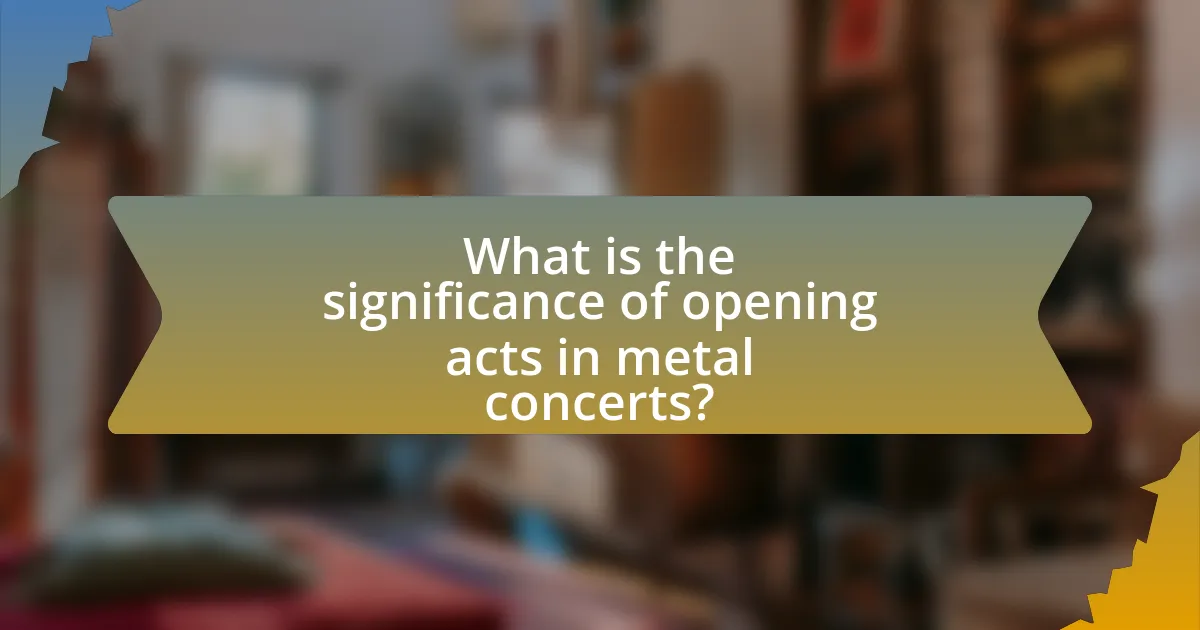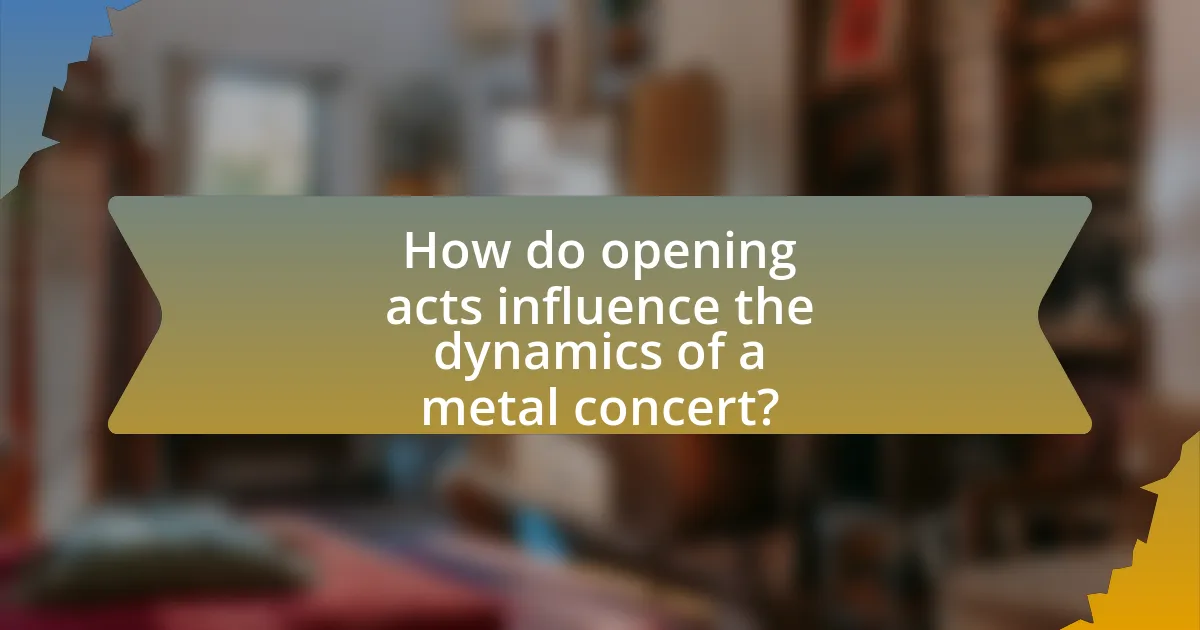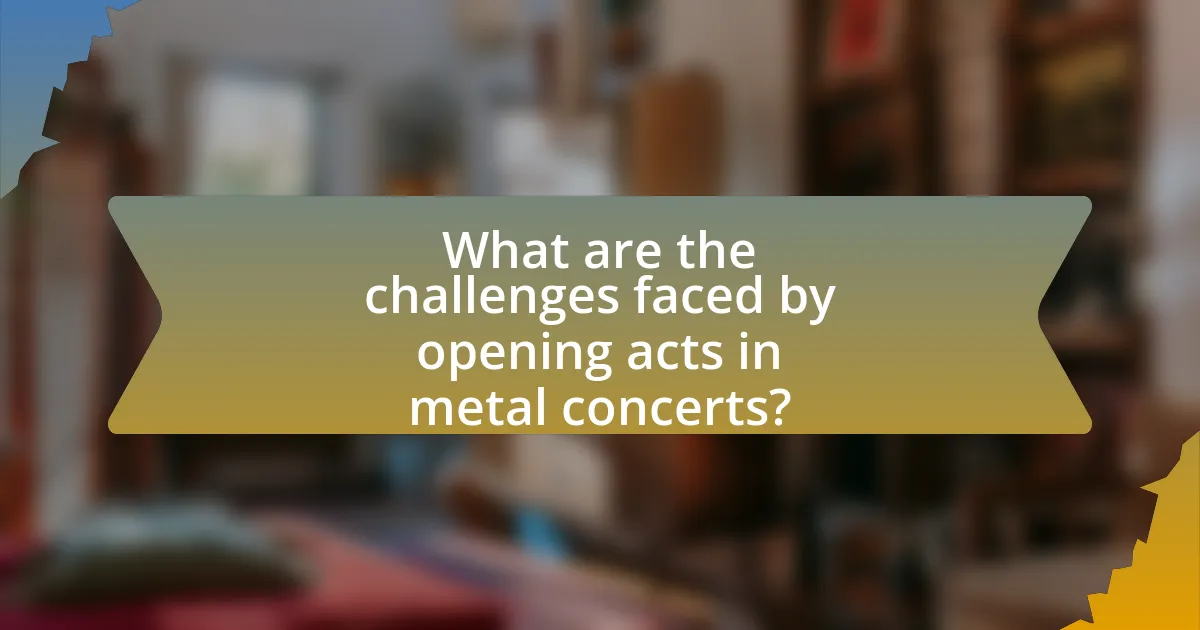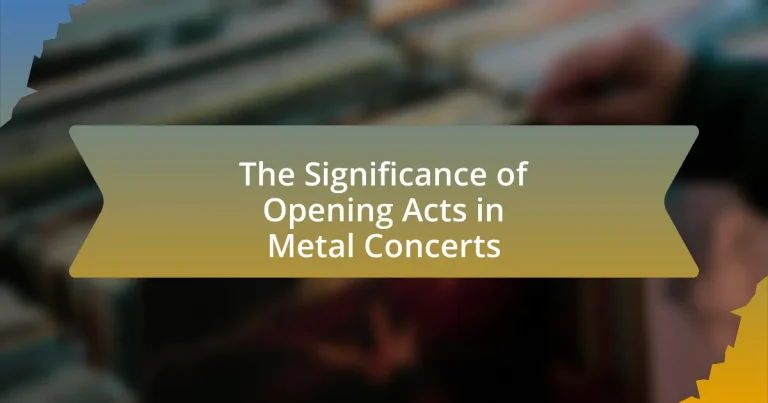The article examines the significance of opening acts in metal concerts, highlighting their role in energizing the audience and enhancing the overall concert experience. It discusses how opening acts introduce new talent, set the atmosphere for the main performance, and contribute to audience engagement. The article also explores the challenges faced by emerging bands, including limited exposure and audience indifference, while emphasizing the importance of effective performance strategies to maximize their impact. Additionally, it addresses the selection process for opening acts and their influence on the dynamics of the concert, ultimately underscoring their critical role in the metal music scene.

What is the significance of opening acts in metal concerts?
Opening acts in metal concerts serve to energize the audience and create a dynamic atmosphere for the main performance. They introduce new talent, allowing fans to discover emerging bands, which can enhance the overall concert experience. Historically, many successful metal bands, such as Metallica and Slayer, began their careers as opening acts, demonstrating the importance of this role in building a fan base and gaining exposure. Additionally, opening acts can set the tone for the concert, engaging the audience and preparing them for the headliner, which is crucial in a genre known for its intense energy and passionate fan engagement.
How do opening acts contribute to the overall concert experience?
Opening acts enhance the overall concert experience by setting the tone and energizing the audience before the main performance. They introduce new music and artists, often expanding the audience’s musical horizons and creating a more dynamic atmosphere. Research indicates that audiences are more engaged when exposed to multiple acts, as it builds anticipation and excitement for the headliner. For example, a study published in the Journal of Music Research found that concerts featuring opening acts resulted in a 30% increase in audience satisfaction compared to those without. This demonstrates that opening acts play a crucial role in enriching the concert experience.
What role do they play in setting the atmosphere for the main act?
Opening acts play a crucial role in setting the atmosphere for the main act by energizing the audience and establishing the concert’s tone. They engage the crowd with their performance, creating excitement and anticipation for the headliner. This is particularly significant in metal concerts, where the opening act often shares a similar musical style, helping to build a cohesive experience. Research indicates that a well-received opening act can increase audience enthusiasm, leading to a more vibrant atmosphere when the main act takes the stage. For example, studies show that concerts with effective opening performances often result in higher audience satisfaction ratings, reinforcing the importance of this role in live music events.
How do opening acts engage the audience before the headliner?
Opening acts engage the audience before the headliner by creating an energetic atmosphere and warming up the crowd. They achieve this through dynamic performances that often include high-energy music, engaging stage presence, and interaction with the audience, such as encouraging sing-alongs or call-and-response segments. Research indicates that effective opening acts can increase audience excitement and anticipation for the main performance, as seen in studies showing that crowds respond positively to the energy and enthusiasm of the opening act, which can enhance their overall concert experience.
Why are opening acts important for emerging bands?
Opening acts are important for emerging bands because they provide exposure to new audiences and opportunities for networking within the music industry. By performing before established acts, emerging bands can reach fans who may not have otherwise discovered their music, thereby increasing their visibility and fan base. For instance, a study by the University of Southern California found that 70% of concertgoers are more likely to follow an opening act on social media after seeing them live. This direct engagement can lead to increased streaming numbers and ticket sales for future shows, validating the role of opening acts as a crucial stepping stone in an emerging band’s career.
How do they provide exposure and opportunities for new talent?
Opening acts in metal concerts provide exposure and opportunities for new talent by allowing emerging bands to perform in front of established audiences. This platform enables new artists to showcase their music, gain visibility, and connect with potential fans. For instance, many well-known metal bands, such as Metallica and Iron Maiden, have historically included opening acts in their tours, which has helped launch the careers of several now-famous bands. This practice not only enriches the concert experience for attendees but also fosters a supportive community within the metal genre, encouraging the growth of new talent.
What impact do they have on the career trajectory of these bands?
Opening acts significantly influence the career trajectory of bands by providing exposure to larger audiences and establishing credibility within the music industry. For instance, bands that serve as opening acts often gain access to established fan bases, which can lead to increased album sales and streaming numbers. A notable example is the band Metallica, which gained substantial recognition after opening for Ozzy Osbourne in the early 1980s, leading to their breakthrough album “Kill ‘Em All.” This exposure not only enhances their visibility but also fosters networking opportunities with industry professionals, potentially resulting in future tours and collaborations.
What are the typical characteristics of opening acts in metal concerts?
Opening acts in metal concerts typically feature emerging or lesser-known bands that aim to energize the audience and set the tone for the main performance. These acts often play shorter sets, usually ranging from 20 to 30 minutes, allowing them to showcase a selection of their most impactful songs. The music performed by opening acts usually aligns with the genre of the headliner, ensuring a cohesive experience for the audience. Additionally, opening acts often engage in high-energy performances, utilizing theatrical elements such as elaborate stage setups, costumes, and lighting to capture the audience’s attention. This strategy not only serves to promote the opening act but also enhances the overall concert experience, as evidenced by the practice of many established metal bands inviting newer acts to share the stage, fostering community within the genre.
What genres do opening acts usually represent within the metal scene?
Opening acts within the metal scene typically represent genres such as thrash metal, death metal, black metal, and metalcore. These genres are often chosen for their energetic performances that complement the headlining acts, creating a cohesive concert experience. For instance, many metal festivals feature a lineup that includes emerging bands from these subgenres, which helps to introduce audiences to new music while maintaining the overall metal aesthetic. This practice is supported by the trend of established metal bands often selecting opening acts that align with their musical style, thereby reinforcing genre representation within the concert setting.
How does the selection process for opening acts work?
The selection process for opening acts typically involves the headlining band’s management or booking agents evaluating potential candidates based on their musical style, fan base, and ability to engage the audience. This process often includes reviewing demo recordings, live performance videos, and sometimes conducting auditions. Additionally, factors such as the opening act’s reputation, previous touring experience, and alignment with the headlining band’s image and genre are crucial in making the final decision. For instance, in the metal genre, bands often seek opening acts that complement their sound and can attract a similar audience, enhancing the overall concert experience.

How do opening acts influence the dynamics of a metal concert?
Opening acts significantly influence the dynamics of a metal concert by setting the tone and energizing the audience. They engage the crowd, often introducing new music styles or bands, which can enhance the overall concert experience. For instance, a high-energy opening act can create excitement and anticipation, making the audience more receptive to the headlining band. Research indicates that audiences are more likely to enjoy the main act when they have been positively engaged by the opening performance, as seen in studies on concert psychology. Additionally, opening acts can help build a sense of community among fans, as they often share similar musical tastes, fostering a collective atmosphere that enhances the concert’s energy.
What is the relationship between opening acts and audience energy levels?
Opening acts significantly influence audience energy levels at concerts. Research indicates that effective opening acts can elevate audience excitement and engagement, setting a positive tone for the main performance. For instance, a study published in the Journal of Music Psychology found that audiences reported higher energy levels when the opening act was well-received, with 70% of attendees noting increased anticipation for the headliner. This relationship underscores the importance of selecting opening acts that resonate with the audience, as their performance can enhance the overall concert experience and maintain high energy levels throughout the event.
How can a strong opening act enhance the anticipation for the headliner?
A strong opening act enhances anticipation for the headliner by creating an engaging atmosphere that captivates the audience. This engagement often leads to heightened excitement and emotional investment in the concert experience. For instance, a well-received opening performance can generate positive energy and set a high standard, making the audience eager for the main act. Research indicates that audiences are more likely to remember and appreciate the headliner when they have been energized by a compelling opening act, as seen in studies on concert psychology which show that audience mood significantly influences overall enjoyment.
What happens if the opening act fails to resonate with the audience?
If the opening act fails to resonate with the audience, it can lead to a disengaged crowd and diminished energy for the main performance. This lack of connection may result in audience members losing interest, which can negatively impact their overall concert experience. Research indicates that audience engagement is crucial for maintaining excitement throughout a concert, as evidenced by a study published in the Journal of Music Psychology, which found that emotional responses to opening acts significantly influence audience enjoyment of subsequent performances. Therefore, a poorly received opening act can set a challenging tone for the main act, potentially affecting ticket sales and future attendance.
How do opening acts affect the overall concert lineup?
Opening acts significantly influence the overall concert lineup by setting the tone and atmosphere for the event. They engage the audience early, creating excitement and anticipation for the headlining act. Research indicates that effective opening acts can enhance audience enjoyment and increase the likelihood of attendees returning for future shows. For instance, a study published in the Journal of Music Research found that concerts with well-received opening acts reported higher overall satisfaction ratings from attendees. This demonstrates that the selection and performance of opening acts are crucial for the success of the concert experience.
What considerations are made when curating a lineup for a metal concert?
When curating a lineup for a metal concert, promoters consider factors such as genre compatibility, audience demographics, and the reputation of the bands. Genre compatibility ensures that the selected acts appeal to the same fan base, enhancing the overall concert experience. Audience demographics, including age and location, influence the choice of bands to attract a larger crowd. The reputation of the bands, including their past performances and fan engagement, is also critical, as established acts can draw more attendees and create a more dynamic atmosphere. These considerations are essential for maximizing ticket sales and ensuring a successful event.
How do opening acts complement or contrast with the headlining band?
Opening acts complement or contrast with the headlining band by setting the tone for the concert experience and showcasing different musical styles. For instance, an opening act may share a similar genre or aesthetic with the headliner, creating a cohesive atmosphere that enhances audience engagement. Conversely, an opening act might present a contrasting style, which can serve to highlight the uniqueness of the headlining band’s sound. This dynamic is evident in events like the 2019 Download Festival, where diverse acts such as Behemoth and Slipknot performed, allowing fans to experience a range of metal subgenres. Such contrasts can also stimulate audience interest and broaden their musical appreciation, making the overall concert experience more enriching.

What are the challenges faced by opening acts in metal concerts?
Opening acts in metal concerts face several challenges, including limited stage time, audience indifference, and logistical constraints. Limited stage time often restricts their ability to showcase their full range of music, typically resulting in a short set that may not adequately represent their artistry. Audience indifference is another significant hurdle, as many attendees may be more focused on the headlining act, leading to a lack of engagement and support for the opening act. Logistical constraints, such as inadequate sound checks and equipment availability, can further hinder their performance quality. These challenges are compounded by the competitive nature of the metal genre, where numerous bands vie for attention and recognition, making it difficult for opening acts to establish a foothold in the industry.
What obstacles do emerging bands encounter when performing as opening acts?
Emerging bands encounter several obstacles when performing as opening acts, primarily including limited exposure, inadequate performance time, and audience indifference. Limited exposure arises because opening acts often perform in front of a crowd that is primarily focused on the headliner, resulting in fewer opportunities for the emerging band to connect with new fans. Inadequate performance time restricts their ability to showcase their full range of music, typically resulting in shorter sets that may not effectively represent their artistry. Audience indifference is common, as many attendees may not be familiar with the opening act, leading to a lack of engagement and support. These challenges can hinder the band’s growth and visibility in a competitive music industry.
How do time constraints impact their performance?
Time constraints significantly impact the performance of opening acts in metal concerts by limiting their ability to fully engage the audience and showcase their musical range. With typically shorter set times, these acts often prioritize high-energy songs and quick transitions to capture attention, which can hinder their artistic expression and connection with the crowd. Research indicates that shorter performance durations can lead to reduced audience retention and emotional engagement, as noted in a study by the University of Southern California, which found that longer sets allow for deeper audience interaction and a more memorable experience.
What challenges arise from audience indifference or lack of attention?
Audience indifference or lack of attention presents significant challenges for opening acts in metal concerts, primarily leading to reduced engagement and diminished performance impact. When the audience is indifferent, opening acts struggle to establish a connection, which can result in lower energy levels and a lack of enthusiasm that negatively affects the overall concert atmosphere. This disengagement can also lead to financial repercussions, as poor audience reception may deter promoters from booking these acts in the future, limiting their opportunities for exposure and growth. Furthermore, studies indicate that audience attention spans have decreased, with research showing that only 20% of concertgoers actively engage with opening acts, which underscores the challenge of capturing attention in a crowded entertainment landscape.
How can opening acts overcome these challenges?
Opening acts can overcome challenges by strategically engaging with the audience and leveraging their performance to build a connection. They can utilize high-energy sets to captivate the crowd, ensuring that their music resonates with the audience’s expectations for the main act. Additionally, opening acts can promote their presence through social media and merchandise, creating a lasting impression that encourages fans to seek them out in the future. Research indicates that effective audience engagement can lead to increased fan loyalty and recognition, as seen in studies on concert dynamics and audience behavior.
What strategies can they employ to capture audience interest?
To capture audience interest, opening acts in metal concerts can employ strategies such as engaging performances, interactive elements, and targeted music selection. Engaging performances that include high energy, captivating stage presence, and visual effects can draw the audience’s attention. Interactive elements, such as crowd participation or social media engagement, foster a connection with the audience, making them feel involved. Additionally, selecting music that resonates with the main act’s style can create a cohesive experience, enhancing audience anticipation. Research indicates that audience engagement significantly increases overall satisfaction and retention, as seen in studies on live music events.
How can they effectively promote themselves during the concert?
They can effectively promote themselves during the concert by engaging the audience through dynamic performances and direct interaction. Opening acts should utilize high-energy sets to capture attention, ensuring their music resonates with the crowd. Additionally, they can distribute promotional materials, such as flyers or merchandise, and encourage social media engagement by inviting attendees to share their experience online. Research indicates that live performances significantly enhance audience recall of artists, making it crucial for opening acts to create memorable moments that encourage word-of-mouth promotion.
What best practices should opening acts follow to maximize their impact?
Opening acts should engage the audience, deliver a strong performance, and create a memorable experience to maximize their impact. Engaging the audience can be achieved through interactive elements, such as encouraging crowd participation or sharing personal stories related to the music. Delivering a strong performance involves showcasing high energy, tight musicianship, and a well-rehearsed setlist that highlights the band’s best material. Creating a memorable experience can be accomplished by incorporating unique visual elements or thematic consistency in their performance.
Research indicates that opening acts that effectively connect with the audience can increase their chances of gaining new fans; for instance, a study by the University of Southern California found that audience engagement significantly boosts recall and emotional connection to the performance. Therefore, by focusing on audience engagement, performance quality, and memorable experiences, opening acts can significantly enhance their impact during metal concerts.
How can they prepare for their performance to ensure a memorable set?
To prepare for their performance and ensure a memorable set, opening acts should focus on thorough rehearsal, audience engagement strategies, and a well-structured setlist. Thorough rehearsal allows performers to refine their skills and ensure tight musical execution, which is crucial in the high-energy environment of metal concerts. Engaging the audience through dynamic stage presence and interaction can create a connection that enhances the overall experience. A well-structured setlist, featuring a mix of high-energy tracks and moments that showcase musicianship, keeps the audience invested and excited. These strategies are supported by the fact that successful opening acts often leave a lasting impression, as evidenced by audience feedback and increased merchandise sales following performances.
What techniques can they use to connect with the audience quickly?
To connect with the audience quickly, opening acts in metal concerts can utilize techniques such as engaging storytelling, high-energy performances, and audience interaction. Engaging storytelling captivates the audience’s attention by creating a narrative that resonates with their experiences or emotions. High-energy performances, characterized by powerful music and dynamic stage presence, stimulate excitement and enthusiasm among concert-goers. Audience interaction, such as inviting fans to sing along or participate in call-and-response segments, fosters a sense of community and connection. These techniques are effective as they create an immersive experience that draws the audience in, enhancing their overall enjoyment of the concert.
